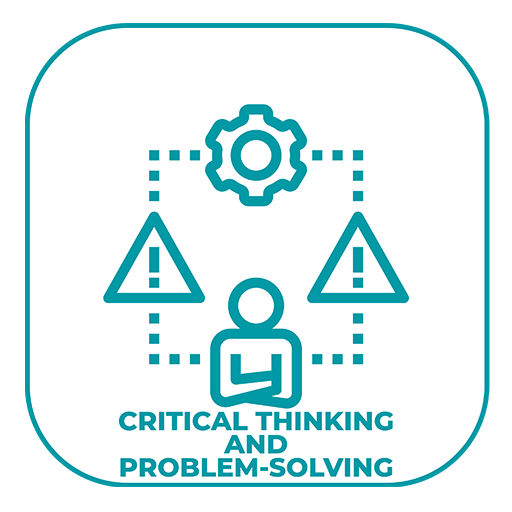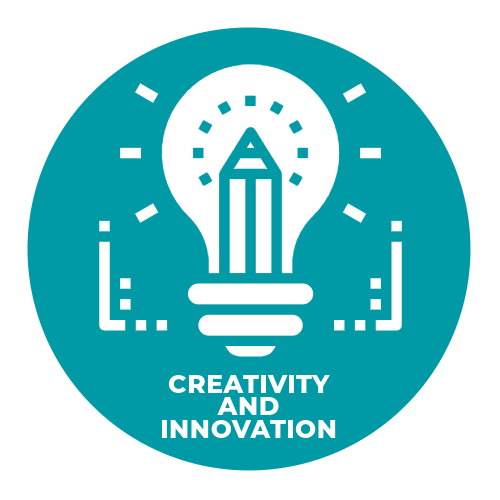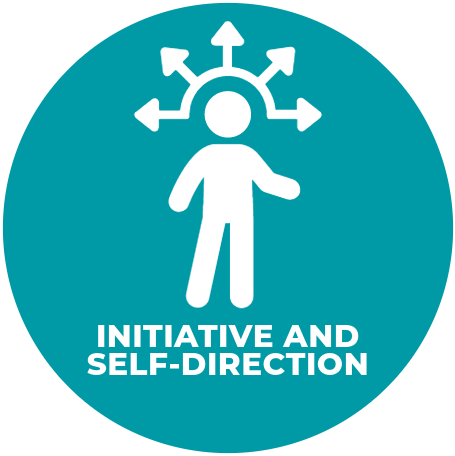Critical thinking is the ability to objectively analyze, evaluate, and interpret information, arguments, and situations systematically and logically. It involves the application of rational and reflective thinking to make informed judgments and decisions based on evidence, facts, and reasoned analysis. At the same time, Problem-Solving is identifying, analyzing, and finding effective solutions to challenges, obstacles, or complex situations. It involves a systematic approach to defining problems, understanding their underlying causes, and developing strategies to overcome them.
“The problem contains the solution. Ask the right question.”
Carl Jung
- Critical Thinking & Problem-Solving Skills
- Analytical Skills: The ability to break down complex problems into smaller components for easier understanding and analysis.
- Research Skills: Proficiency in gathering, evaluating, and synthesizing information from various sources to inform decision-making.
- Logical Reasoning: The capacity to think logically, identify patterns, and draw sound conclusions based on available evidence.
- Creativity: The skill to think outside the box, generate innovative ideas, and approach problems from unconventional angles.
- Open-mindedness: Willingness to consider different perspectives, accept feedback, and adapt one’s views based on new information.
- Effective Communication: The ability to articulate thoughts and ideas clearly, both in writing and verbally, to convey complex information.
- Problem Definition: Skill in clearly defining problems, understanding their scope, and identifying the root causes.
- Decision-Making: The capacity to make informed decisions based on thorough analysis, weighing pros and cons, and considering potential consequences
- Flexibility and Adaptability: Being open to change and able to adjust strategies when necessary in response to new information or unexpected challenges.
- Curiosity: A natural inclination to seek knowledge, explore new ideas, and ask questions to deepen understanding.
- Attention to Detail: Regularly evaluating one’s thought processes, decisions, and actions to identify areas for improvement.
- Reflective Thinking: The ability to think beyond the obvious and envision new possibilities.
- Time Management: Efficiently allocating time to different tasks and priorities, especially when working on complex problem-solving.
- Collaboration: The ability to work effectively with others, leveraging diverse skills and perspectives to arrive at comprehensive solutions.
- Resilience: The capacity to bounce back from setbacks, learn from failures, and maintain a positive attitude during problem-solving processes.
- Ethical Decision-Making: Consistently making decisions that align with ethical standards and principles.
- Data Analysis: Skill in interpreting and drawing meaningful insights from quantitative and qualitative data.
- Systems Thinking: Understanding how individual elements interact within larger systems and considering the broader context when analyzing problems.
Gen Z and Millennials Who Demonstrate Great Critical Thinking and Problem-Solving Skills
“You do not really understand something unless you can explain it to your grandmother.”
Albert Einstein

Fionn Ferreira
Fionn Ferreira has demonstrated critical thinking and problem-solving skills through his innovative work in addressing environmental challenges, specifically the issue of microplastic pollution in water. Fionn identified the significant environmental problem of microplastic pollution in water, showcasing his ability to recognize and prioritize pressing issues affecting the ecosystem. He developed an innovative solution to address the problem by creating a magnetic liquid that attracts and removes microplastics from water, demonstrating creative problem-solving skills. His work showcases a combination of scientific inquiry, creativity, and a commitment to positively impacting the environment. Here is a video of Fionn Ferreira and his invention from the European Patten Office.

Kiara Nirghin
Kiara Nirghin has exhibited critical thinking and problem-solving skills through her innovative work in addressing challenges related to drought conditions in agriculture. Kiara recognized the critical issue of drought affecting agriculture, showcasing her ability to identify and focus on a significant problem with widespread implications. She delved into the scientific aspects of water retention in soil and the impact of drought on crop growth, demonstrating a solid understanding of the problem’s complexities. Kiara developed a cost-effective super-absorbent polymer using orange peel and avocado skins. This innovation aimed to improve water retention in soil, allowing for better moisture management during periods of drought. Kiara Nirghin demonstrated critical thinking by identifying and understanding the complex problem of drought affecting agriculture. Her innovative solution, practical application, environmental considerations, advocacy efforts, and global impact collectively showcase her as a critical thinker and problem-solver committed to addressing real-world challenges. Here is a TedX Talk with Kiara Nirghin, “Are We Wasting Our Brains?”.

Name
Name, description

